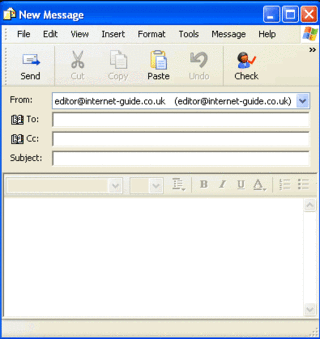How to write an email
I have recently noticed that I have started not to "sign" emails. I mean, as the heading says who is it coming from, is anything more needed? Only if one keeps up the pretence that it is a letter (I mean no one signs a tweet, do they?).
But that is only the start of it. What should an email look like? If we were to scan a book of courtesy and forms of address, how would it advise on emails.
I have to say that, despite what I have just said, I actually prefer those emails which are exactly as old-fashioned letters would have been: "Dear Mary... Yours, Simon" (I hope Dr Heffer is reading this, because it to you whom I refer, though I rather doubt you are!). I find myself more irritated with those much more email specific locutions, that play too much with the apparent familiarity of the genre.
I, for example, do use "Hi Simon" (though not to Dr Heffer), but sort of hate myself when I do. There's worse.
I particularly dislike the phrase (sorry to those that I am going to annoy now) that greets many unsolicited email communications, "Dear Mary, I hope this email finds you well...". Did letters once start like that? Maybe they did, but not any that I used to receive. And it does seem the worst sort of inanity. (On the principle of "nothing is worth saying unless its reverse would be meaningful", this fails miserably... "I hope this email finds you ill.."?)
And then there is the false jollity that the medium seems to encourage. I really hate getting emails in July from students (more people I am now going to annoy), which start "Dear Mary, I hope you are having a lovely holiday..". Err sorry, sunshine, I have been, and am, working my socks off, and while you might think this is a holiday (and honestly you shouldn't, as you should be working too), I DONT. (Did they use to say this in letters, I think not.. It was more, "Dear Prof Beard, I am very sorry to disturb you, but I wonder if I could ask for some advice on....".
There is also the false sense of entitlement that the genre implies. Don't get me wrong, if people write to me with a genuine question about the ancient world, I am happy -- and honoured -- to reply. But when the other week, I got an email from a middle school student in the USA, whose teacher had encouraged her to "reach out" to an expert about Pompeii, I wrote back to say that I was happy to help (be reached out to), but only if she could tell me what books she had already consulted. After one more exchange (with no list of books) the correspondence ran dry. I guess she had probably "reached out" to quite a lot of other experts and they had not imposed any such conditions (like doing a bit of reading..?). For info, I get about 5 of these a week, and always make the same response, which only a few actually rise to.
That one, by the way, started "How do you do?".
So does anyone know of a style guide to emails. When I was at school we seemed to take ages learning when to say "Yours faithfully" or "Yours sincerely". Are kids now being taught the rhetoric of emails? Is "I hope this email finds you well" or "How do you do" actually being RECOMMENDED?
Someone must know,
Mary Beard's Blog
- Mary Beard's profile
- 4110 followers




